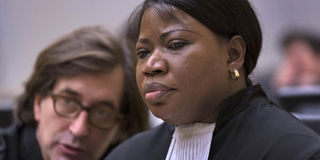The ‘disappearing’ witnesses that killed Bensouda’s case

International Criminal Court (ICC) prosecutor Fatou Bensouda. The dramatic withdrawal of key witnesses, particularly Witness Number Four, may have been the straw that broke the camel’s back for ICC prosecutor. PHOTO | MICHAEL KOOREN |
What you need to know:
- Without their testimony, especially on the alleged planning of the 2007/8 violence, the prosecutor was left clutching at straws. Or what Senator Kithure Kindiki described as flogging a dead horse.
- This was a unique case in which the accused was the head of the government, which was required by the Rome Statute to assist with evidentiary material for his prosecution.
- However, proof of planning and Mr Kenyatta’s interaction with Mungiki were dealt a huge blow with the withdrawal of evidence by witness Number Four, who claimed to have been one of the leaders of the proscribed group.
The dramatic withdrawal of key witnesses, particularly Witness Number Four, may have been the straw that broke the camel’s back for ICC prosecutor Fatou Bensouda.
Without their testimony, especially on the alleged planning of the 2007/8 violence, the prosecutor was left clutching at straws. Or what Senator Kithure Kindiki described as flogging a dead horse.
Ms Bensouda had on January 31, 2014, blamed the lack of progress on the case, which could not proceed to trial, on withdrawal of crucial testimony, death of key witnesses and non-cooperation by the Kenya government.
Four key witnesses of the 12 who testified against President Uhuru Kenyatta before the charges were confirmed, dropped out.
“Mungiki members said to have interacted with [President Kenyatta] in person during the PEV were killed or forcibly disappeared in an apparent clean-up operation after the violence. The pre-trial period was marked by attempts to bribe and intimidate key witnesses,” she told the judges.
BIGGEST HURDLE
This was a unique case in which the accused was the head of the government, which was required by the Rome Statute to assist with evidentiary material for his prosecution.
One of the biggest challenges Ms Bensouda faced was to prove there was planning in President Kenyatta’s case. Planning is a key element for a case to meet the Rome Statute threshold for crimes against humanity.
That is why the allegation that Mr Kenyatta and others held meetings in Nairobi to plan retaliatory attacks in Naivasha was a key pillar of the prosecution without which the case could not have been confirmed.
Another key element in the prosecution narrative was the alleged involvement of members of the outlawed Mungiki gang in the violence and their association with Mr Kenyatta.
The prosecutor alleged that Mr Kenyatta had met and supported Mungiki to conduct revenge attacks in Naivasha.
However, proof of planning and Mr Kenyatta’s interaction with Mungiki were dealt a huge blow with the withdrawal of evidence by witness Number Four, who claimed to have been one of the leaders of the proscribed group.
The prosecution consistently submitted that key witnesses were bribed to pull out, leading to the earlier collapse of the case against former Head of Public Service Francis Muthaura, who was Mr Kenyatta’s alleged co-conspirator.
CHIEF WITNESS
Witness Four had told the prosecution that he was present at meetings in State House on November 23, 2007, and another at Nairobi Club where Mr Kenyatta and Mr Muthaura allegedly planned violence.
During these meetings, it was alleged that the two facilitated Mungiki to conduct killings in Naivasha.
However, in a later statement to the ICC, the witness said he lied about his presence in the two meetings. It is on this basis that the Muthaura case collapsed. The prosecutor alleged bribery.
“Witness Four revealed in an interview in May 2012 that he had been offered and accepted money from individuals holding themselves out as representatives of the accused to withdraw his testimony and provided e-mails and records that confirmed the bribery scheme,” the prosecutor told the court.
“We have no evidence against Muthaura. There are other reasons… Several people who may have provided important evidence regarding Mr Muthaura’s actions have died, while others are too afraid to testify for the prosecution,” she told the court in her application to withdraw the charges.
But the enduring question was: Did the prosecutor have a competent case against President Kenyatta after the recanting of such critical evidence and Mr Muthaura’s clearance?





